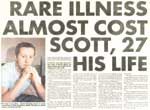A young man who survived a rare heart condition which can cause sudden death, told his terrifying story this week.
Twenty-seven-year-old Scott Fleming had no idea he had Wolfe-Parkinson-White Syndrome until he collapsed while playing football. As paramedics battled to save his life, Scott’s heart stopped beating on several occasions and he slipped into a coma. Doctors thought the design technician would be brain damaged and told his mother they didn’t think he would make it. But after having surgery and making a full recovery, Scott is now on a bid to raise awareness of WPW.

“After my operation I searched and have not found anyone else other than myself who was not diagnosed and went through what I did and survived.”
Scott, from Ladeside Drive in Blackburn, said he has always been fit and healthy and the only signs that something was wrong before he collapsed were palpitations when running.
“I’ve always been in good shape and had no idea I had this condition,” he said. “I am very lucky to have survived, although my confidence has taken a bit of a dent and I do wake up at night sometimes feeling scared.
I feel worse for my mum though, who had to sit by my bedside and be told by doctors that they didn’t think I would make it through.”
WPW is a very rare cause of sudden death in young people, and is caused by an extra electrical connection between the atria (upper chambers of the heart) and the ventricles (lower chambers of the heart.)
It is found in 1.5 people in every thousand and can only be detected by an electrocardiogram (ECG) scan, although a small number of patients experience palpitations, light-headedness or blackouts.
Scott was treated by an operation called a radio frequency catheter ablation at the Edinburgh Royal Infirmary, which saw surgeons passing a wire into the heart, through the large artery in his leg. The abnormal pathway which causes WPW is located by electrical stimulation and destroyed by passing a high current through it.
Scott says he should not have any more problems and has returned to full health since his ordeal on December 12. He said he is grateful to all the medical staff who treated him and to family and friends who have supported him.
The doctors have said that I am fit enough again to train to the level of an Olympic athlete, but I really want to raise awareness about this condition,” he said.
“The statistics are scary because eight young, healthy people are diagnosed every week in Britain with this.
“Also, 1.5 people from every thousand are thought to suffer from this and when you consider there are 15 to 20,000 people living in Bathgate alone, then that is a walking time bomb.”






